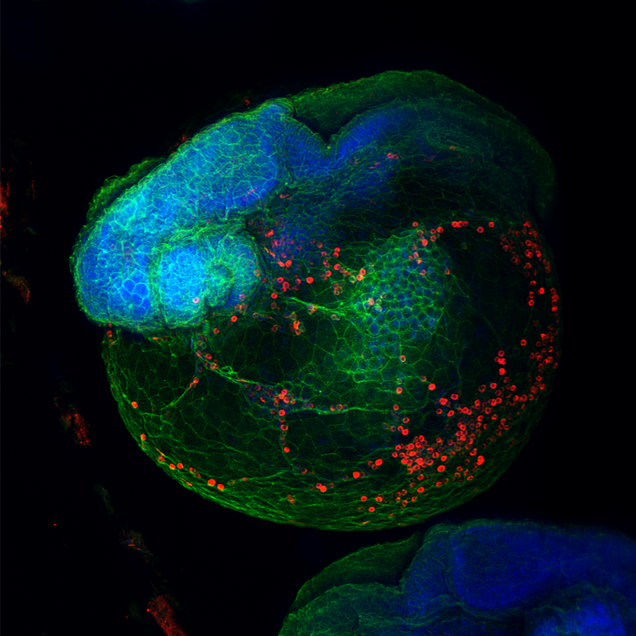Daniel Cifuentes, PhD, Studies RNA Regulation with Zebrafish and Viruses
 This summer, Dr. Daniel Cifuentes, an assistant professor of biochemistry at Graduate Medical Sciences, received one of several $75,000 BU Ignition Awards aimed at helping promising research initiatives find a potential pathway to commercial success.
This summer, Dr. Daniel Cifuentes, an assistant professor of biochemistry at Graduate Medical Sciences, received one of several $75,000 BU Ignition Awards aimed at helping promising research initiatives find a potential pathway to commercial success.
The Cifuentes Lab works on a variety of projects that study the fundamental mechanisms of RNA regulation, a universal process for all life on Earth.
RNA carries from the DNA the information necessary to create new proteins in the body, and faulty RNA regulation has the potential to cause debilitating diseases like cancer or even render a growing embryo inviable.
“The beginning of new life is one of the most enigmatic and dynamic events. RNA regulation is the central point of this.” Cifuentes said. “If [RNA regulation] doesn’t happen, then you cannot thrive. You don’t develop as an embryo.
In their research, Cifuentes and his team focus on the three main players that orchestrate and govern RNA regulation: microRNAs, RNA-binding proteins and post-transcriptional RNA modifications.
Using zebrafish as a primary model system for studying vertebrate development, the Cifuentes lab examines the earliest stages of embryo formation.
The advantage of zebrafish as a model organism, according to Cifuentes, is that once the lab dissected a new RNA mechanism, they can eventually analyze its effects on an actual organism – and their findings can eventually apply to human beings.
“We study universal RNA regulatory processes,” Cifuentes said. “We study that in the most efficient way in the simplest organism we can.”
The Cifuentes lab also studies filoviruses – a group of single-strand RNA viruses that includes the Ebola and Marburg viruses. Filoviruses represent an effective primary model system for viral replication at the RNA level. Because these viruses contain an RNA genome, RNA regulation is a key player in the infection cycle of these viruses.
To carry out this research, Cifuentes collaborates with the lab of Elke Mühlberger, PhD, within the National Emerging Infectious Diseases Laboratory (NEIDL) at Boston University. Mühlberger is a professor of microbiology at BU School of Medicine.

“The projects might seem a little bit disparate and distant from each other,” Cifuentes said. “[…] But all of these projects have the common theme that addresses the fundamental mechanisms of RNA processing and regulation.”
The implications of Cifuentes’ research are widespread. Thanks to the discovery of RNA regulation in early embryos, the Cifuentes lab now knows which RNA-binding proteins regulate and orchestrate the network of maternal mRNAs and which ones are regulated by which proteins.
The lab has also made significant advances in understanding how microRNAs regulate red blood cell development, research that has significant implications for anemia. In collaboration with the Chitalia Lab – managed by Associate Professor of Medicine Vipul Chitalia, MD, PhD – Cifuentes and his team are studying how microRNAs play a role in the anemia of end-stage kidney disease patients.
As for what’s next, Cifuentes said that his lab will “go wherever the RNA research takes us.” This year’s Ignition Award, along with several other awards Cifuentes and his team have won in the past, will help them do just that.
“The Ignition Award is based on something that was missing in the field, which was a very efficient, cheap, fast and reliable method to measure the protein-RNA interactions,” Cifuentes said. “The previous techniques were very cumbersome, very tedious and biased and very difficult to analyze.”
“Now, with this method, we have data showing that this will be a gamechanger for how the field studies RNA-protein interactions, and if we can track these RNA-protein interactions, we’ll get a new window into how RNAs are regulated in the cell, organism or virus.”
Cifuentes arrived at the BU Department of Biochemistry at the end of 2015. He was born and raised in Barcelona, Spain, where he completed his PhD at the University of Barcelona. In 2008, he moved to the United States to complete his postdoctoral training at Yale University.
Last year, the Cifuentes Lab was one of five BU research teams to receive funding through the Rajen Kilachand Fund for Integrated Life Sciences and Engineering for his work in understanding animal evolution at a molecular level. This project integrates the human microRNA processing machinery into yeast to test if the microRNAs can allow the yeast to develop in more challenging conditions.
Of his lab, Cifuentes said, “I would like to highlight that that only happens because of the great team that I have been able to assemble. Science doesn’t occur in isolation. It requires a whole team of people in the lab and collaborators.”
The Cifuentes Lab is located on the fourth floor of Silvio O. Conte Medical Research Building. Read more about Cifuentes’ work here.